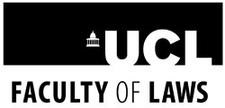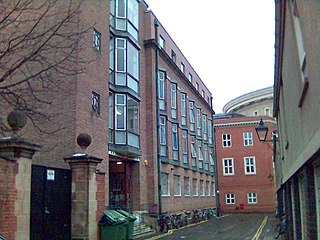Jewish studies is an academic discipline centered on the study of Jews and Judaism. Jewish studies is interdisciplinary and combines aspects of history, Middle Eastern studies, Asian studies, Oriental studies, religious studies, archeology, sociology, languages, political science, area studies, women's studies, and ethnic studies. Jewish studies as a distinct field is mainly present at colleges and universities in North America.

The Oxford Internet Institute (OII) is a multi-disciplinary department of social and computer science dedicated to the study of information, communication, and technology, and is part of the Social Sciences Division of the University of Oxford, England. It is housed over three sites on St Giles in Oxford, including a primary site at 1 St Giles, owned by Balliol College. The department undertakes research and teaching devoted to understanding life online, with the aim of shaping Internet research, policy, and practice.

New College in The University of Edinburgh is one of the largest and most renowned centres for (post)graduate studies in Theology and Religious Studies in the UK, with students in M.A., M.Th. and Ph.D. degree programmes coming from over 30 countries. There are now nearly 40 full-time members of the academic staff, and they include internationally respected scholars in various specialities.

The Oxford Centre for Hindu Studies, founded in 1997, is a Recognised Independent Centre of the University of Oxford, England. The Centre is engaged in developing academic programmes of education, research and publishing in the field of Hindu studies. The Centre also aims to encourage the Hindu community in the academic study of their own traditions and cultures.
'This development in the field of Hindu Studies at Oxford is very exciting. It is an important addition to Oxford's wealth of resources on India and Indian religious traditions. It fits in well with our goal to attract more Indian students to come and study at Oxford. The new official association provides a platform for the Oxford Centre for Hindu Studies and Oxford University to move forward together in teaching, research and publishing.'

The Department of Computer Science is the computer science department of the University of Oxford, England, which is part of the university's Mathematical, Physical and Life Sciences Division. It was founded in 1957 as the Computing Laboratory. By 2014 the staff count was 52 members of academic staff and over 80 research staff. The 2015 QS World University Subject Rankings places Oxford 3rd in the world for Computer Science and 1st in Europe with Cambridge in 7th. Oxford is also the top university for computer science in the UK and Europe according to Business Insider and was ranked 2nd for Computer Science and Information Systems in the 2016 Guardian University league tables.

The UCL Faculty of Laws is the law school of University College London (UCL). It is one of UCL's 11 constituent faculties and is based in London, United Kingdom. It is one of the world’s leading law schools, and ranked 8th globally in the 2018 Times Higher Education World University Rankings for Law.

The Faculty of Oriental Studies, formerly the Oriental Institute (O.I.), is part of the Humanities Division of the University of Oxford.
The University of British Columbia's Okanagan Campus is a campus of the University of British Columbia, located in Kelowna, British Columbia, Canada. It is home to close to 9,700 undergraduate and graduate students. The 209-hectare (516-acre) campus is the research and innovation hub in the southern interior of the province, in British Columbia's Okanagan Valley.

The Oxford Centre for Hebrew and Jewish Studies (OCHJS) is a Recognised Independent Centre of the University of Oxford, England. Its research fellows teach on a variety of undergraduate and master's degrees in Oriental studies, and it publishes the Journal of Jewish Studies.
Gavin Dennis Flood FBA is a British scholar of comparative religion specialising in Shaivism and phenomenology, but with research interests that span South Asian traditions. From October 2005 through December 2015 he served in the Faculty of Theology University of Oxford and as the Academic Director of the Oxford Centre for Hindu Studies which is a Recognised Independent Centre of the University of Oxford. In 2008 Flood was granted the title of Professor of Hindu Studies and Comparative Religion from the University of Oxford. In 2014 he was elected a Fellow of the British Academy, the United Kingdom's national academy for the humanities and social sciences. In November 2015, it was announced that Dr. Flood would become the inaugural Yap Kim Hao Professor of Comparative Religious Studies at Yale-NUS College in Singapore; taking up the position from January 2016. He is a Senior Research Fellow at Campion Hall, Oxford.
Oleh Vitaliyovych Kozerod is a political scientist and history researcher. He came from a Polish-Ukrainian aristocratic family Kazirod bearing the Zadora coat of arms.
The Faculty of Medieval and Modern Languages at the University of Oxford, England, was established in 1903. It is part of Oxford's Humanities Division.
The Faculty of History at the University of Oxford organises that institution's teaching and research in modern history. Medieval and Modern History has been taught at Oxford for longer than at virtually any other University, and the first Regius Professor of Modern History was appointed in 1724. The Faculty is part of the Humanities Division, and has been based at the former City of Oxford High School for Boys on George Street, Oxford since the summer of 2007, while the department's Library was removed from the former Indian Institute on Catte Street to the main Bodleian buildings at the start of 2013.

The Centre for Quantum Computation (CQC) is an alliance of quantum information research groups at the University of Oxford. It was founded by Artur Ekert in 1998.
The Oxford Centre for Buddhist Studies (OCBS) was founded in 2004 by Prof Richard Gombrich, Emeritus Boden Professor of Sanskrit at the University of Oxford. The Centre is a Recognised Independent Centre of the University of Oxford.
The Graduate Theological Foundation (GTF) is a nonprofit interreligious institution of higher learning centered in Mishawaka, Indiana. Unlike traditional residential theological schools, the foundation focuses on continuing educational opportunities for practicing ministry professionals, administrators and academics who want to pursue advanced degrees while retaining their current position. Students and faculty reside around the world, and scholarly work takes place through onsite, online and distance learning engagement. Students are eligible to earn bachelors, masters and doctoral degrees in a variety of theological disciplines. Faculty members come from a broad spectrum of faith backgrounds, and many also serve on the faculty of established colleges and universities, including the University of Oxford, with which the Foundation has a continuing education affiliation through the Oxford Theology Summer School.
The University Engagement Programme of the Ashmolean Museum was established at the University of Oxford in 2012 with funding from the Andrew W. Mellon Foundation. Its purpose is to explore new avenues for the use of the Museum’s collections in the teaching of the University.
The Department of Social Policy and Intervention is a leading interdisciplinary centre for research and teaching in social policy and the systematic evaluation of social intervention based in the Social Sciences Division of the University of Oxford. It dates back to ‘Barnett House’, a social reform initiative founded in 1914 and became a department of University of Oxford in 1961. The Department hosts two main research units: the Oxford Institute of Social Policy (OISP) and the Centre for Evidence-Based Social Intervention (CEBI). Since October 2017 Professor Bernhard Ebbinghaus is Head of Department.
Sebastian Patrick Quintus Rahtz (SPQR) was a British digital humanities information professional. Born in 1955 to Somerset-focused archaeologist Philip Rahtz, Sebastian trained in archaeology, before delving into the computing realm via Lexicon of Greek Personal Names (LGPN) in 1982. He remained a long-term contributor to multiple communities in the broader digital humanities, including LGPN, TeX, computer methods in archaeology, and the Text Encoding Initiative (TEI). Sebastian's legacy also includes the vital contributions which he made to building and maintaining much of the TEI's technical Infrastructure and related software such as their XSLT Stylesheets and web-based document conversion engine OxGarage CLAROS, the Oxford Text Archive, Text Creation Partnership and OSS Watch.
Lou Burnard is an internationally recognised expert in digital humanities, particularly in the area of text encoding and digital libraries. He was assistant director of Oxford University Computing Services (OUCS) from 2001 to September 2010 where he officially retired from OUCS. Prior to that, he was manager of the Humanities Computing Unit at OUCS for five years. He has worked in ICT support for research in the humanities since the 1990s. He was one of the founding editors of the Text Encoding Initiative (TEI) and continues to play an active part in its maintenance and development, as a consultant to the TEI Technical Council and as an elected TEI board member. He has played a key role in the establishment of many other key activities and initiatives in this area, such as the UK Arts and Humanities Data Service, and the British National Corpus and has published and lectured widely. Since 2008 he has also worked as a Member of the Conseil Scientifique for the CNRS-funded "Adonis" TGE.










